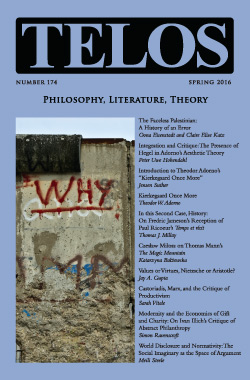Simon Ravenscroft’s “Modernity and the Economics of Gift and Charity: On Ivan Illich’s Critique of Abstract Philanthropy” appears in Telos 174 (Spring 2016). Read the full article at the Telos Online website, or purchase a print copy of the issue in our online store.
 This essay explores the theological and philosophical underpinnings of the work of the radical Catholic social theorist Ivan Illich (1926–2002), via a discussion of the changing meaning of charity in Western thought and practice. It is argued that Illich’s thought is animated by a traditional theological understanding of charity as anchored in local, personal bonds and networks of reciprocity, and that his critique of Western economic modernity has much to do with the gradual depersonalization and institutionalization of charity, theoretically and in society, linked to its transmogrification into “abstract” philanthropy. Drawing on debates around the nature of love and the gift in contemporary theology, philosophy, and social anthropology, the conceptual dynamics of Illich’s account of human sociality are made clear. Illich’s continual concern throughout his life with defending spaces for meaningful human interaction, and with attacking those institutional and technological forms that threaten the interpersonal dimension of human life, can in this way be read as an outworking of his underlying concern for charity, understood as social bond. Illich was something of a maverick intellectual, whose thematically disparate body of work remains little understood outside a small group of former friends and collaborators, despite his prior fame and notoriety. A priest who resigned his post in the late 1960s, his difficult relations with the Church hierarchy led him to leave the theological meaning of his work largely opaque. This essay is among the first to examine in rigorous, academic terms the theological and philosophical contours of his thought.
This essay explores the theological and philosophical underpinnings of the work of the radical Catholic social theorist Ivan Illich (1926–2002), via a discussion of the changing meaning of charity in Western thought and practice. It is argued that Illich’s thought is animated by a traditional theological understanding of charity as anchored in local, personal bonds and networks of reciprocity, and that his critique of Western economic modernity has much to do with the gradual depersonalization and institutionalization of charity, theoretically and in society, linked to its transmogrification into “abstract” philanthropy. Drawing on debates around the nature of love and the gift in contemporary theology, philosophy, and social anthropology, the conceptual dynamics of Illich’s account of human sociality are made clear. Illich’s continual concern throughout his life with defending spaces for meaningful human interaction, and with attacking those institutional and technological forms that threaten the interpersonal dimension of human life, can in this way be read as an outworking of his underlying concern for charity, understood as social bond. Illich was something of a maverick intellectual, whose thematically disparate body of work remains little understood outside a small group of former friends and collaborators, despite his prior fame and notoriety. A priest who resigned his post in the late 1960s, his difficult relations with the Church hierarchy led him to leave the theological meaning of his work largely opaque. This essay is among the first to examine in rigorous, academic terms the theological and philosophical contours of his thought.



